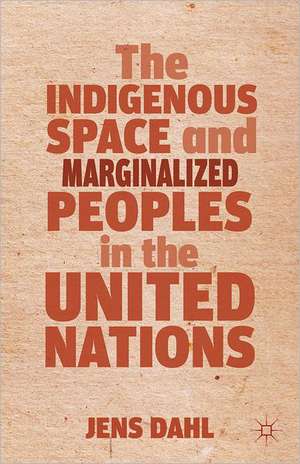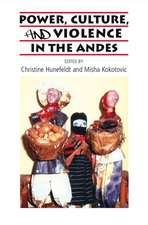The Indigenous Space and Marginalized Peoples in the United Nations
Autor J. Dahlen Limba Engleză Hardback – 5 dec 2012
| Toate formatele și edițiile | Preț | Express |
|---|---|---|
| Paperback (1) | 385.25 lei 6-8 săpt. | |
| Palgrave Macmillan US – 5 dec 2012 | 385.25 lei 6-8 săpt. | |
| Hardback (1) | 390.63 lei 6-8 săpt. | |
| Palgrave Macmillan US – 5 dec 2012 | 390.63 lei 6-8 săpt. |
Preț: 390.63 lei
Nou
Puncte Express: 586
Preț estimativ în valută:
74.76€ • 77.45$ • 62.39£
74.76€ • 77.45$ • 62.39£
Carte tipărită la comandă
Livrare economică 21 martie-04 aprilie
Preluare comenzi: 021 569.72.76
Specificații
ISBN-13: 9781137280534
ISBN-10: 1137280530
Pagini: 298
Ilustrații: XIV, 296 p.
Dimensiuni: 140 x 216 x 21 mm
Greutate: 0.48 kg
Ediția:2012
Editura: Palgrave Macmillan US
Colecția Palgrave Macmillan
Locul publicării:New York, United States
ISBN-10: 1137280530
Pagini: 298
Ilustrații: XIV, 296 p.
Dimensiuni: 140 x 216 x 21 mm
Greutate: 0.48 kg
Ediția:2012
Editura: Palgrave Macmillan US
Colecția Palgrave Macmillan
Locul publicării:New York, United States
Cuprins
Setting the Stage The Untied Nations as a Platform Three Cases Representation: The Indigenous Caucus Different but United Indigenous Strategies and Performances 'We know who we are' Going Home Concluding Perspectives
Recenzii
"This book sets the record straight and seeks to redress the situation by examining the UN's posture toward indigenous peoples rights and issues. This book is recommended to social scientific students and readers, but most of all for all who need information about what indigenous peoples have achieved by develops an 'alternative space' within and outside the UN structure." - Henry Minde, professor, department of History and Religious Studies, University of Tromsø, Norway
"Jens Dahl's nuanced history and analysis of the emergence of a global indigenous network impresses on a number of fronts: firstly, its temporal and spatial scope covering the emergence of transcultural mobilization from disparate world regions and political contexts; secondly, its perceptive ethnographic investigation of the local and international fora, agencies and agents (author included) that have enabled the institutionalization of an indigenous presence at the UN; and thirdly, his forceful theoretical rejoinder to those who attribute structural inefficacy to subaltern voices. Dahl balances attention between the international domain and well-selected case studies that highlight the diversity of indigenous organizations, from Maasai NGOs in Tanzania and Kenya and Aymara grassroots organizations in the Andes to Jumma resistance fighters in Bangaladesh and the Inuit Greenland Self-Rule Parliament. Dahl's own involvement as a former director of the International Work Group for IndigenousAffairs (IWGIA) lends him a perspective that few scholars can match. A tour de force, this book will be the one people turn to for decades to come to learn how to effect political change on a global scale." - Kelly Askew is and anthropologist and Director, of African Studies Center, The University of Michigan, and author of Performing the Nation: Swahili Music and Cultural Politics in Tanzania)
"Jens Dahl's nuanced history and analysis of the emergence of a global indigenous network impresses on a number of fronts: firstly, its temporal and spatial scope covering the emergence of transcultural mobilization from disparate world regions and political contexts; secondly, its perceptive ethnographic investigation of the local and international fora, agencies and agents (author included) that have enabled the institutionalization of an indigenous presence at the UN; and thirdly, his forceful theoretical rejoinder to those who attribute structural inefficacy to subaltern voices. Dahl balances attention between the international domain and well-selected case studies that highlight the diversity of indigenous organizations, from Maasai NGOs in Tanzania and Kenya and Aymara grassroots organizations in the Andes to Jumma resistance fighters in Bangaladesh and the Inuit Greenland Self-Rule Parliament. Dahl's own involvement as a former director of the International Work Group for IndigenousAffairs (IWGIA) lends him a perspective that few scholars can match. A tour de force, this book will be the one people turn to for decades to come to learn how to effect political change on a global scale." - Kelly Askew is and anthropologist and Director, of African Studies Center, The University of Michigan, and author of Performing the Nation: Swahili Music and Cultural Politics in Tanzania)
Notă biografică
Jens Dahl is an adjunct professor in the Department of Cross-Cultural and Regional Studies at the University of Copenhagen, Denmark.















